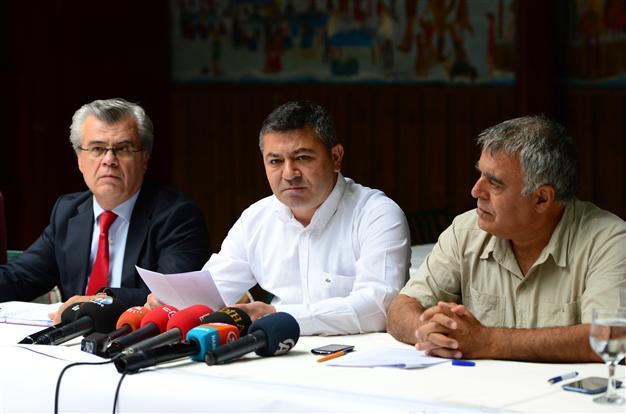Alevi Bektaşi Federation refuses to attend Turkish PM’s iftar invitation
ANKARA

The Alevi community’s key demands have so far not been met by the government, President Fevzi Gümüş (C) of the Alevi Bektaşi Federation said at a press conference on July 21. AA Photo
The Alevi Bektaşi Federation, a leading umbrella organization of the Alevi community, has declared that it will not attend a fast-breaking iftar meal hosted by Prime Minister Recep Tayyip Erdoğan for Alevi organizations and opinion leaders.The Alevi community’s key demands have so far not been met by the government, President Fevzi Gümüş of the Alevi Bektaşi Federation said at a press conference on July 21, while elaborating on their reasons for not accepting the invitation.
“While children have been dying in Gaza, Syria and Iraq, sitting at a haraam [sinful according to Islam] table at luxurious restaurants where fake smiles and untrue statements are delivered does not befit Alevis,” Gümüş said of the dinner, which will be hosted on the evening of July 21.
He also listed some of the Alevi community’s unmet demands: Official recognition of cemevis; an end to compulsory religion classes; converting the building of the Madımak Hotel in Sivas, in which 35 people were killed by an arson attack, into a museum; and the return of assets and properties of Alevi-Bektaşi dervish lodges.
Alevis support a resolution, in contrast with presidential hopeful Erdoğan who is merely seeking a “wallflower” opportunity, Gümüş maintained. Despite having refused the invitation, they are ready to meet with the government at any level under equal conditions for the resolution of fundamental problems of the Alevi people, he added.
Alevism is widely perceived as a liberal sect of Islam, although a few characterize it as a belief system separate from Islam. Alevis, who are described as followers of the Caliph Ali, the nephew and son-in-law of the Prophet Muhammad, display religious practices distinct from Turkey’s Sunni majority.
The Alevi worship ceremony is called a “cem,” and is traditionally held in a cemevi, while Sunnis worship in a mosque. Unlike most other Muslim practices, Alevi rituals are conducted mostly in Turkish. The ceremony features music and dance called the “sema.” The order founded on the teachings of Hacı Bektaş Veli is called “Bektaşi,” while the term “Kızılbaş” usually refers to the Alevi Kurds of Dersim.
















